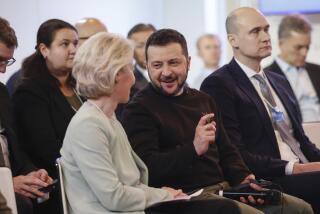Russia Summit Fails to Address Critical Issues
- Share via
MOSCOW — If any doubt remained about the futility of President Clinton’s summit with Russian President Boris N. Yeltsin, the body language of the two leaders at Wednesday’s concluding news conference removed it.
Clinton, who usually revels in the role of world statesman at such media events, was conspicuously subdued and visibly unhappy--even before he was hit by further humiliating questions about his extramarital affair with former White House intern Monica S. Lewinsky.
Yeltsin moved awkwardly and glared through much of the hour he spent before the cameras, handling reporters’ questions with comments that ranged from opaque to flip but were consistently short of meaningful content.
Asked if he could accept someone other than his own nominee, Viktor S. Chernomyrdin, as a prime minister to lead Russia out of its current economic and political turmoil and if he is prepared to dissolve parliament if the lower house continues to reject his choice, Yeltsin simply avoided a straight answer.
“Well, I must say, quite a few things will have to happen to bring about such results,” he said. Then he stopped in his verbal tracks. After a prolonged pause that left many in the room wondering if he had been taken ill, Yeltsin eventually added, “That’s all.”
The reason for their stilted performances was easy to find: It was a summit of two politically wounded leaders.
For Yeltsin, the news conference, and the two-day summit itself, merely highlighted what he had most wanted to hide: that he has no answers and has no plan for guiding his long-suffering nation back from the brink.
For Clinton, the timing also was terrible. Not only was he unable to offer his Russian counterpart any substantive help out of the crisis, but he also was forced to face a news conference for the first time since admitting his sexual relationship with Lewinsky in a televised address to the nation 2 1/2 weeks ago.
Clinton seemed to wilt further when the inevitable questions came.
“I have acknowledged that I made a mistake, said that I regretted it, asked to be forgiven, spent a lot of very valuable time with my family in the last couple of weeks and said I was going back to work,” Clinton said.
(First Lady Hillary Rodham Clinton managed what appeared to be a forced smile and an “I’m just fine” when asked Tuesday how she was coping with the scandal.)
Only two things seemed to rescue the summit from falling below its already low expectations: the signing of two measures to reduce the threat of accidental nuclear attack, and the chance for Clinton to begin the process of looking beyond the Yeltsin era by meeting with a group of potential successors.
But the main issue--Russia’s deepening crisis, which has sent global stock markets on a wild weeklong ride--remained largely untouched.
Two long, one-on-one rounds of talks in the Kremlin between the two leaders did nothing to ease the wrenching choice that looms over Russia’s future, between one set of political leaders wedded to many of the bankrupt economic ideas that led to the collapse of Moscow’s Communist empire a decade ago, and another group--including Yeltsin and Chernomyrdin--whose policies have led post-Communist Russia into its current chaos.
Over the two days, Clinton’s main response to the crisis came in the form of rhetoric--a “keep-your-chin-up” pep talk aimed at boosting public morale, and a lecture to all willing to listen that Russia must stay on the path of democratic, free-market reform.
“The answer to the present difficulties is to finish the job that has been begun, not to stop it in midstream or to reverse course,” Clinton said at Wednesday’s news conference.
But there are signs that even that advice may be seriously flawed.
On Wednesday, as the ruble slipped further and questions grew about the viability of Chernomyrdin’s candidacy, Yeltsin’s own credibility appeared to be waning further.
In a country whose history is filled with strong, feared leaders, citizens have begun to consider their president’s comments irrelevant.
Reacting to questions about how to interpret a Yeltsin comment about possibly shifting some control--at least temporarily--back to the state, Masha Lipman of the Itogi news weekly offered her advice: “I wouldn’t pay much attention to what he says because it doesn’t really matter anymore.”
Hear an analysis of the Russia summit from Times staff writer Elizabeth Shogren on The Times’ Web site, at: https://fold6.site/summit
More to Read
Sign up for Essential California
The most important California stories and recommendations in your inbox every morning.
You may occasionally receive promotional content from the Los Angeles Times.










